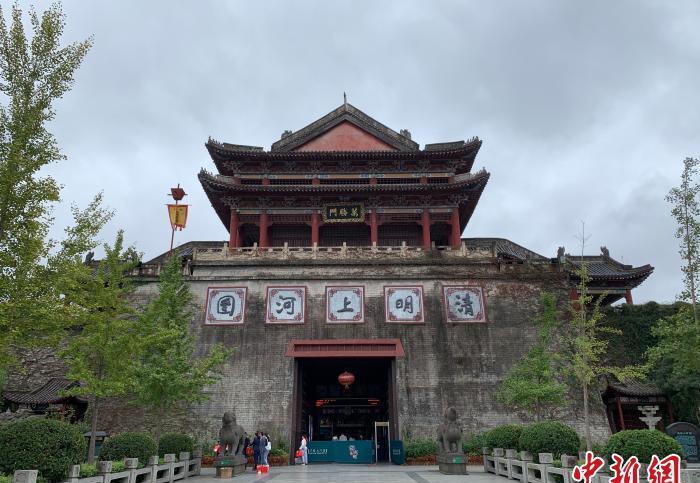
Hengdian Film and TELEVISION City Qingming Upper River Map Shooting Base. Photo by Guo Qiyu
Xinhua, October 17, China News Network Title: When the screen lights up: Taiwan's love affair in the "light and shadow" of Hengdian, Zhejiang
Author Guo Qiyu
At nightfall, the "Qingming River Map" scenic spot in Hengdian Film and Television City is still brightly lit, and occasionally the crew shuttles to shoot scenes, and young people chase their dreams in light and shadow.
Hengdian in Jinhua, Zhejiang Province, has built the most complete film and television industry ecosystem in China: 2/3 of China's film and television works have received more than 3,000 crews for this purpose, becoming the world's largest film and television live-action shooting base.
With the rise of shooting bases such as Guangzhou Street in Southern Guangdong, QinWang Palace, Ming and Qing Palace Garden, and Qingming Shanghe Tu, global film and television people have flocked to the ground. More and more directors and actors from Taiwan are also crossing the Yiwan Strait and following the trail.
Film and television shooting in Hengdian Film and Television City. Photo by Guo Qiyu
In the early 1990s, Li Zhixi, who had nearly a decade of acting experience in Taiwan, chose to come to the mainland to develop, and was later well known by mainland audiences for filming film and television dramas such as "Ghost Husband" and "Condor Heroes". Talking about why he chose to "land" for development, Li Zhixi told the China News Network reporter: "I came to the mainland not to 'land', but to go home. ”
Li Zhixi's ancestral home is in Xiong County, Hebei Province, or a Peking Opera family, and he has more traditional cultural feelings. "Therefore, when the two sides of the strait opened up for mutual exchanges, I began to come to the mainland to shoot dramas, and since then I have been going back and forth between taiwan and the mainland for decades." In Li Zhixi's view, the same is true of cross-strait film and television cultural exchanges, which have never been interrupted for decades.
After filming in Hengdian, Li Zhixi will return to his cousin's house in Beijing, and in his opinion, "to go back to Beijing is to go home", because the two sides of the strait are already close to each other.
Hengdian Film and TELEVISION City Yuanmingyuan Shooting Base. Photo by Guo Qiyu
After settling in Hengdian, taiwanese director Xiao Bicun's WeChat address became "Zhejiang Jinhua". From the first time he came to the mainland in 1987 to shoot "The Woman in the Tower", in the past 34 years, Xiao Bicun has grown from a videographer to a director with his own team, and has realized his dream with the development of Hengdian.
In the more than 30 years on the mainland, Xiao Bicun has filmed a number of film and television dramas cooperated by actors from both sides of the strait, such as "Smiling Proud of the Rivers and Lakes" and "The Story of the Dragon Slaughtering in the Heavens". He believes that the experience of co-shooting is the best exchange of film and television talents between the two sides of the strait.
"Although the development of Taiwanese actors to the mainland will be hindered by the Taiwan authorities today, I still encourage young people to have the opportunity to come to the mainland to take a look, there is a broader market and greater opportunities." SiuBi village said.
In this regard, Young Taiwanese actor Liu Mingkai agreed, since coming to the mainland in 2017 to pursue his dreams, Liu Mingkai has filmed a number of film and television dramas, and now he is also trying to share and tell more cross-strait stories through new media. "The mainland does have more development opportunities and is also very friendly to Taiwan compatriots, and I plan to continue to stay on the mainland in the future." Liu Mingkai said.
It is said that Hengdian is a place of dreams. In the interlacing of light and shadow, "horizontal drift" rounds the dream of stardom, and tourists round the dream of crossing. More and more young people in Taiwan are also building dreams here.
A few days ago, Ma Xiaoguang, spokesman for the Taiwan Affairs Office of the State Council, said that we will, as always, support and encourage cross-strait cultural exchanges and cooperation and welcome Taiwan entertainers to the mainland for development. It is hoped that more Taiwan entertainers will share opportunities and play an active role in the development of the mainland's cultural undertakings. (End)
Source: China News Network